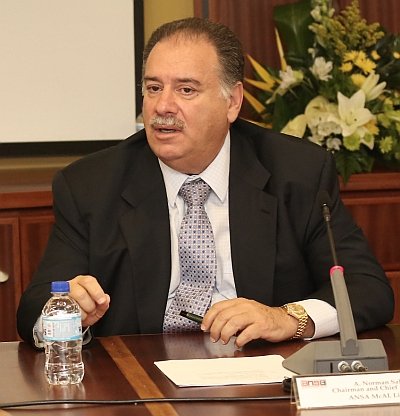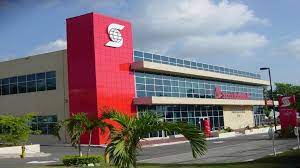Highlights
• Net profit attributable to shareholders of $489 million for the quarter (2019: $3,055 million); and $494 million for the six months (2019: $3,947 million)
• Earnings per stock unit for the quarter of $0.46 (2019: $2.92); and $0.47 for the six months (2019: $3.76)
• Book value per stock unit of $40.32 at 30 June 2020 (31 December 2019: $40.36)
• Ordinary dividend paid during the quarter of $0.275 (2019: $0.265)
Stephen B. Facey, Chairman & Chief Executive Officer of PanJam Investment Limited, is reporting that while global financial markets experienced significant volatility in the June quarter, the group’s securities portfolio broadly retained its value during the second quarter. The Group however saw its financial performance resulting in a loss of JA$61 million, while the COVID-19 pandemic continues to have a significant impact on Jamaica.
The closure of the country’s borders during the second quarter of 2020, along with other government-imposed measures, resulted in reduced economic activity, particularly in tourism and travel-related businesses. The effect of this was seen in the losses generated by associated company investments, which include hotel operations and adventure tours he reported.
Commenting further in his report included in the unaudited consolidated financial statements for the six months ended 30 June 2020, he noted that the Groups real estate assets, again, demonstrated resilience, with their property segment performing admirably over the three-month period.
Associated companies, which operate in a number of industries, have seen varying levels of impact. Positive highlights of their performance include the strong results produced by New Castle Company (the owners of the Walkerswood brand) and Sagicor Group Jamaica (“Sagicor”)’s core insurance and employee benefits business lines.
The results of associated companies consist principally of their 30.2% investment in Sagicor, noting that they also hold minority positions in a number of diverse private entities.
PanJam’s share of results of associated companies for the first six months of 2020 decreased by $1billion, or 47 percent, driven principally by Sagicor’s results, but also negatively influenced by results from the Courtyard by Marriott Kingston and Chukka Caribbean Adventures, both of which saw little business activity during the second quarter due to the COVID-19 pandemic.
Facey also noted in his report to shareholders that PanJam has spent decades creating a robust balance sheet, specifically for times such as these. As at the end of June, the group held cash and cash equivalents of $2.2 billion and maintained a conservative leverage ratio which, when combined, would enable them to raise financing in order to capitalize on attractively-priced investment opportunities that may arise.
Looking at the Groups Balance Sheet, he reported that total assets at June 30, 2020, amounted to $58.1 billion, compared to $54.4 billion at December 31, 2019, and $50.3 billion at June 30, 2019. Stockholders’ equity of $42.7 billion was relatively flat to the 31 December 2019 balance of $42.7 billion. This equates to a book value per stock unit of $40.32 (December 31, 2019: $40.36).
Notwithstanding the strength of their balance sheet, management has taken a number of steps to preserve cash, including rigid cost containment exercises and the suspension of quarterly dividends for both May and August 2020, as they navigate the uncertain timeline associated with this pandemic.
Six-month operating expenses of $824 million (2019: $847 million) decreased as a result of cost-saving measures. Finance costs for the same period of $378 million (2019: $378 million) were flat when compared to 2019 as a result of lower average interest rates on a larger debt portfolio.
In terms of the Groups Income Statement, he reported that net profit attributable to owners of $489 million for the three months ended 30 June 2020 was significantly below the $3,055 million recorded in the same period in 2019.
Last year’s results were heavily influenced by unrealized gains from a portfolio of Jamaican equities, which were largely erased in the first quarter of 2020. The decline in the second quarter’s profit compared to last year was also driven by a decline in the share of results of associated companies, as well as a non-recurring gain on the disposal of shares in associated companies of $941 million in 2019.
Earnings per stock unit for the quarter were $0.46 (2019: $2.92).
PanJam’s securities trading portfolio suffered a minor loss for the quarter, in line with movements in stock and bond prices both locally and globally. Portfolio composition, including exposure to Jamaican equities, reflects confidence in the nation’s eventual economic recovery and their well-defined approach to investment risk management he reported.
Net profit attributable to owners for the six months ended 30 June 2020 amounted to $494 million (2019: $3,947 million), equivalent to earnings per stock unit of $0.47 (2019: $3.76).
The performance was heavily influenced by investment losses of $1,145 million (2019: $1,278 million of income), a decrease of $1,001 million in share of results of associated companies, and the second quarter non-recurring gain on the disposal of shares in associated companies of $941 million in 2019, which more than offset increases of $162 million in property income and $294 million in other income.
Investment losses were driven by unrealized losses in their portfolio of local and overseas securities, despite higher interest, dividend income, and foreign exchange gains. Property income increased due to high occupancy, contractual rate increases, and devaluation effects on leases denominated in US dollars. Other income was boosted by gains from the sale of the Bamboo Avenue property in Kingston.
With stable occupancy levels, year-to-date property income grew 17 percent when compared to the same period in 2019. This as their relationships with tenants have grown stronger and, on that basis, believes that their properties will continue to hold significant value.


 Businessuite Markets2 weeks ago
Businessuite Markets2 weeks ago
 Businessuite Markets4 weeks ago
Businessuite Markets4 weeks ago
 Logistics & Transportation4 weeks ago
Logistics & Transportation4 weeks ago
 Leadership Conversations3 weeks ago
Leadership Conversations3 weeks ago
 Businessuite Markets4 weeks ago
Businessuite Markets4 weeks ago
 Businessuite Women3 days ago
Businessuite Women3 days ago
 Businessuite Markets4 weeks ago
Businessuite Markets4 weeks ago
 Business Insights2 weeks ago
Business Insights2 weeks ago













 The second quarter of the financial year unfolded within a still recovering economic environment. Jamaica experienced two consecutive quarters of economic contraction prior to this period, with the latest data from the Planning Institute of Jamaica (PIOJ) indicating a return to modest growth.
The second quarter of the financial year unfolded within a still recovering economic environment. Jamaica experienced two consecutive quarters of economic contraction prior to this period, with the latest data from the Planning Institute of Jamaica (PIOJ) indicating a return to modest growth.
 For the period under review, the Group’s consolidated balance sheet remained sound with a stable cash position, providing the financial flexibility to support ongoing operations and strategic initiatives.
For the period under review, the Group’s consolidated balance sheet remained sound with a stable cash position, providing the financial flexibility to support ongoing operations and strategic initiatives.

 Scotia Group reports net income of $9.2 billion for the six months ended April 30, 2025, representing an increase of $665.6 million or 7.8% over the prior year. Net income for the quarter of $5 billion reflected an increase of $797.9 million or 19% over the previous quarter. The Group’s asset base grew by $87 billion or 12.9% to $763.5 billion as at April 2025 and was underpinned by the excellent performance of our loan and investment portfolios.
Scotia Group reports net income of $9.2 billion for the six months ended April 30, 2025, representing an increase of $665.6 million or 7.8% over the prior year. Net income for the quarter of $5 billion reflected an increase of $797.9 million or 19% over the previous quarter. The Group’s asset base grew by $87 billion or 12.9% to $763.5 billion as at April 2025 and was underpinned by the excellent performance of our loan and investment portfolios.





